Forum results: WATER in Ukraine-2025
The forum «WATER in Ukraine-2025: under the prism of climate change, war and food security» was organised by the Professional Association of Environmentalists of the World (PAEW), the Office of Sustainable Solutions, with the support of the Embassy of the Kingdom of the Netherlands in Ukraine on 10 January 2025.
Download in Engels: 'Presentation Sandra Kolodzinskyi RVO - Dutch-Ukrainian Cooperation in Water Sector'
Download in Engels: 'Презентація Сандри Колодзінські RVO - Нідерландсько-українська співпраця в водному секторі'
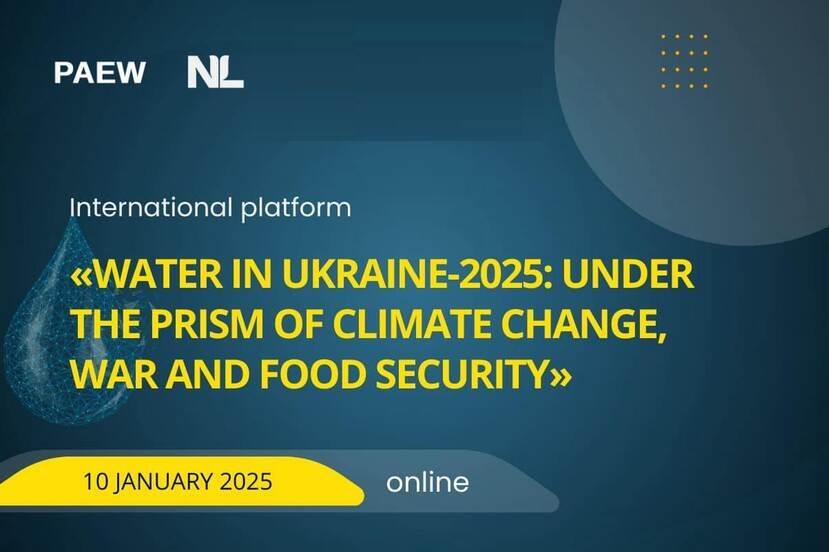
PAEW gathered more than 360 participants to consolidate efforts around water conservation and restoration in Ukraine: community leaders (from large cities to small village councils) from all regions of Ukraine, water utilities, design institutes, leading scientific institutions, enterprise ecologists, engineers, representatives of infrastructure projects, international donor projects, international experts and PAEW partners from the Netherlands, USA, Austria, Poland, Belgium, Estonia.
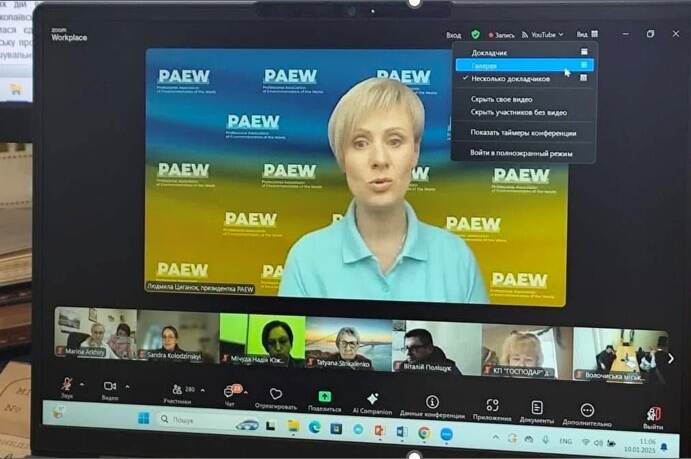
«First of all, let's agree that water should no longer be considered in Ukraine only as a resource - it is primarily an ecosystem service!» addressed the participants Liudmyla TSYGANOK, President of the Professional Association of Environmentalists of the World, and added:
«The resource approach is a static approach: as something that can be extracted and used.
This simplistic view does not take into account the natural processes through which water exists and regenerates.
An ecosystem service is a dynamic approach: it is the benefits that people receive from nature.
When it comes to water, ecosystems provide:
- Water purification: Soils, wetlands and rivers filter pollution.
- Regulation of the hydrological cycle: Forests, river basins and oceans influence the water cycle in nature (e.g. through evaporation and rainfall).
- Maintaining biodiversity: Ecosystems provide habitats for organisms that depend on water.
- The link between ecosystems and water: Water does not exist on its own, it is a product of the functioning of ecosystems.
For example: The water in a river depends on the condition of the forests in its basin. Water quality is determined by the ecological state of aquatic ecosystems.
Thus, when we call water an ecosystem service, we draw attention to its connection with natural processes and the dependence of its availability on the health of ecosystems, rather than just considering it as a resource for exploitation. »
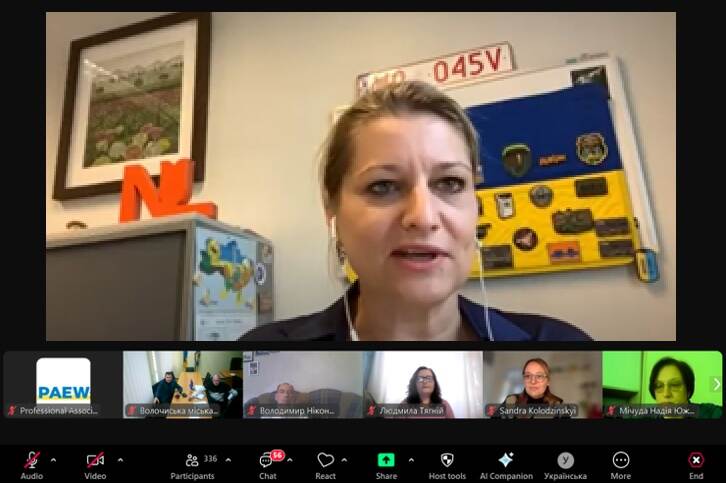
Carolien SPAANS, Agricultural Counsellor of the Embassy of the Netherlands in Ukraine said: «Water is essential for our food security.
That is clear in Ukraine as well in the Netherlands. The Netherlands is located in a Delta. It is a low-lying country, with rivers and canals, making it vulnerable to flooding. Our history and culture have been formed by water.
Throughout centuries, Dutch people have come together to build dikes and protect lives, homes and livelihoods. This is how back in 12th century the Dutch waterboards has been created – our country’s oldest democratic institution. This experience and working together help us to adapt and create sustainable solutions across sectors when it comes to water related challenges.
In Ukraine, you know the value and force of water as well. Rivers help deter the enemy. And we all remember the power of water after the Kakhovka dam was blown up, and catastrophic consequences for several regions of Ukraine, in particular for irrigation and food security.
There are, in my opinion, two important features in the Dutch approach to pay special attention to in finding the right solutions for Ukraine.
First, it’s about close cooperation between the stakeholders.
Second, it’s about the fact that there is no one-size-fits all solutions for every area.
In the Netherlands, companies, knowledge institutions and government organisations work closely together to develop the technologies and solutions of the future. We work across sectors and «connect minds» to find solutions to current and future societal challenges. Robust and sustainable water management processes require good governance and coordination.
The Dutch Ministries of Economic Affairs and Climate, and of Infrastructure and Water Management, water expertise centres like Deltares and universities, and the private sector come together in the Dutch Top Sector for Water and Maritime. This has enabled the Netherlands to form a strong knowledge base in the water sector.
Four Dutch ministries have joined hands to form a comprehensive water policy called the Netherlands International Water Ambition. (contrary to current battle between ministries in Ukraine).
The Netherlands supports programmes which promote international water and climate adaptive projects through the Netherlands Enterprise Agency.
These include disaster reduction programmes such as the Dutch Risk Reduction (DRR), long-term commitments like the Partners for Water programme and Reversing the Flow launched in 2022.
The national Delta Programme is the national coordinating and investment programme for long-term water management in the Netherlands. It ensures water safety and sufficient supply of fresh water until 2050. There is no one-size-fit-all solution. Because every situation is different. That’s why it is important to take a geographical area as a starting point to determine the optimal use of water, energy and food.
This requires us, first and foremost, to understand how the systems are interconnected.»
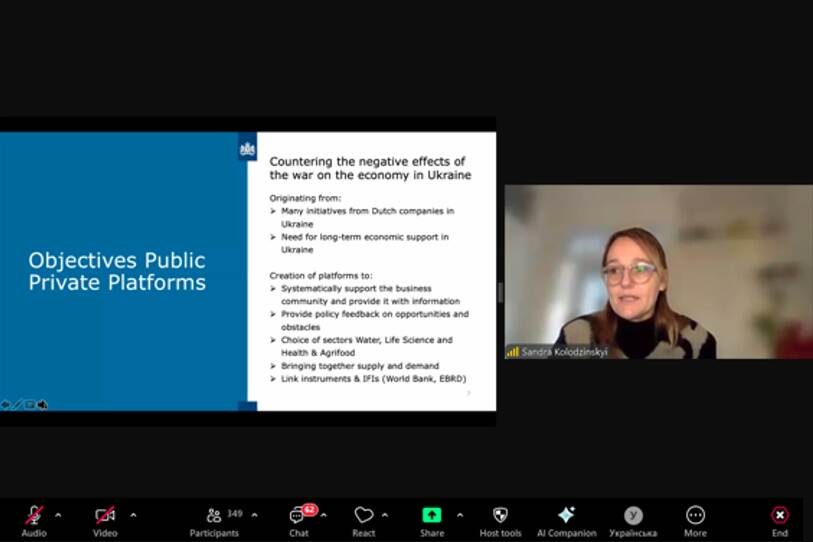
Sandra KOLODZINSKYI, Program Coordinator Reconstruction Ukraine & Circular Economy International, Team International Climate & Energy (ICE) of Agency for the Netherlands Enterprise agency (RVO), focused her speech on financing programmes available in Ukraine for the Dutch companies and their Ukrainian Partners they jointly wouild like to work on opportunities in Ukraine. Also Sandra presented the Ukraine Water Public-Private-Partnership Platform in the Netherlands that united Dutch companies in water sector and Ukrainian counterparts. The Platform in currently focuses on the following priorities:
- Critical infrastructure restoration;
- Water supply and quality;
- Water for food;
- Kakhovka dam area marter program
Presentation is attached above.
Anzhelika LIVITSKA, Vice-President of the Professional Association of Environmentalists of the World (PAEW) for International Cooperation and European Integration, Partner at Arzinger Law Firm, Head of Energy and Natural Resources Practice, Co-Head of Real Estate and Construction Practice outlined the situation with water resources in Ukraine during the war. Anzhelika emphasised that there is no consolidated information in the country and to collect all the data, it was necessary to write many appeals to government agencies in order to present a comprehensive picture of the situation.
Valentyn SHCHERBYNA,
Vice President of the Professional Association of Environmentalists of the World (PAEW) for Military Ecology and Ecosystem Restoration, continued:
«Ukrainian society is still not aware of all the risks of the negative effects of global warming on the provision of adequate water quality to the population. The state in general, and executive authorities and local governments in particular, are not ready for the challenges of today and do not have realistic plans for the medium term. Residents of communities do not realise the full danger of the negative effects of climate change on the community and themselves.
The state water policy continues the development of the Soviet resource-based approach to water use, is based on pre-war scenarios of state development, and is aimed mainly at conserving and distributing existing water resources and declaratively achieving their ‘good condition’. The pre-war Water Strategy of Ukraine for the period up to 2050 plans to increase the water content of river basins at the end of Stage 4, in 25 years. River basin management plans generally have a similar strategic goal - the distribution of available water resources among users. An integrated approach to planning climate change adaptation measures within river catchment areas, which would result in an increase in the water content of small rivers, has not been implemented.
This government policy has resulted in a decrease in the average annual flow of most rivers and the drying up of small rivers, not only because of climate change. The decrease in water availability is mainly due to:
- high share of agricultural land in the catchment area,
- non-compliance with legal requirements within water protection zones and coastal protection strips,
- massive ploughing and construction in aquatic ecosystems and floodplains,
- regulated flows and a large number of dams and ponds,
- insufficient forestation of river basins, destruction of trees and shrubs, and vegetation burning,
- drainage/destruction of swamps and wetlands,
- significant losses of water resources during their inter-basin redistribution for irrigation purposes.
The Professional Association of Environmentalists of the World (PAEW) proposes to radically change the state's water policy based on the resource approach and introduce an ecosystem approach to managing economic activities within river catchment areas.
The implementation of the ecosystem approach in water policy involves restoring landscapes close to natural ones in river basins, which will help adapt the catchment to climate change and restore water flows, among other things.
- This approach is comprehensive, taking into account the laws of ecosystem development, their dynamics, resilience to anthropogenic impacts and natural capacities for self-healing. The implementation of the ecosystem approach allows restoring landscapes damaged as a result of military operations and their integral component - aquatic ecosystems - to a state close to the natural one. Only aquatic ecosystems that are close to natural can ensure a truly good water quality.
- We live in the temperate zone, where lowland rivers have a mixed type of supply - both from rain or snow and from groundwater runoff (overflow), which can be as much as a third of the total supply (Dnipro). In winter, during summer low water, they are fed almost exclusively by groundwater runoff, which gradually reaches the riverbed if it gets into groundwater!
- If it is a small river, ploughed up to the water's edge, silted and littered, the surrounding fields have plough soles and are rolled by heavy machinery to the state of asphalt, the transfer of surface runoff to groundwater will only occur in meadows, pastures, field protection strips, forests and shrubs - where natural vegetation has preserved and maintained the permeability of the soil and transfers surface runoff to groundwater. The amount of underground runoff depends on the area of natural vegetation. This is the alphabet of nature management.
- There are no methods to restore water content of the city alone (except for imported water). The water supply of the city is restored as a result of the restoration of the water supply of the catchment area within the community. The only, fastest and most effective method of water restoration is to capture ALL precipitation over the community's territory and safely store it from evaporation and pollution in groundwater. Every drop of water that falls on the hromada's territory must be preserved. A water «power bank»! There is a little time left to learn how to do this.
- Over the millennia of human existence, the climate has changed many times, often destroying lazy and short-sighted people over large areas, and even civilisations have disappeared. However, there are very effective, simple to the point of primitiveness, methods of accumulating and preserving water resources, invented by ingenious ancestors who survived and passed on their knowledge to us. It is only necessary to choose among the huge number of existing methods those that are guaranteed to work effectively in the natural conditions of the community.
- The main measures should not be aimed at clearing channels for which there is no water in the catchment area to fill them. Cleaning the pipes will not increase the amount of water at the inlet! It is necessary to study the entire catchment area in detail and develop a plan of measures to restore the river's water content using water-saving and water-collecting methods, primarily agroforestry, marsh conservation, alkalisation and reforestation of catchment slopes, etc. It is urgent to reforest and reclaim all land free from development, even if the tree dries up - it has already partially healed the land, paving the way for the next one with its roots, and loosened the ground to transfer surface water runoff into underground water.
Olena POTAPENKO,
Head of Environmental Safety Department at DTEK Grids, PhD, added about the need for deregulation in the field of water management:
«It is reasonable to abolish the duplication of obtaining a permit for special water use by secondary consumers from the networks of primary consumers when obtaining a permit for water use from wells. Currently, the State Agency of Water Resources of Ukraine forces to calculate water withdrawal limits for each facility connected to the water utility networks and prepare a package of documents (maps, connection diagrams, data on meter checks, etc.) - 40-65 pieces per company - to obtain a permit for special water use for several wells. This extends the time required to complete the documents by 2-3 months. There is a duplication of permitting procedures for primary and secondary water use. The Water Code also needs to be revised. There is also a duplication of reporting on water use - companies are forced to enter data into two different information systems. The Ministry of Energy and Ukrenergo annually request reports that duplicate statistical reporting No. 2-tp (water management) in content but are different in form.
This is an additional burden on the enterprises and units of the Ministry of Energy and Ukrenergo, and an unnecessary expenditure of resources for reporting, accounting and administration systems.
The environmental community welcomes the deregulation reform. It is important to intensify joint efforts in dialogue with business and the public.»
Olha TROFIMTSEVA, Head of Agrofood Division at Mykolaiv Water Hub, Acting Minister of Agrarian Policy (2019) focused the participants' attention on the Nexus approach to water management in the agro-industrial complex.
Ukraine should have long been using the best international experience, the effectiveness of which has been proven in practice.
Presentations were continued by Dmytro NOVYTSKYI, President of the Association «Ukrvodokanalekologiya», who shared his view of water from market participants, water utilities, in the context of infrastructure and readiness for modernisation.
Maryna ARKHIRIY, Head of the Krasnosilska hromada of the Odesa Oblast, Head of the Odesa Regional Branch of the All-Ukrainian Association of Local Self-Governments, Head of the «Safety: Ecology» platform, shared the experience of effective water management of the Krasnosilska community: challenges and prospects in the context of climate change and military realities in the Odesa region.
Paul DE LANGE, MSc, Director of BouwCoach Engineering BV / Dutch Civil Design, spoke about the water management system and policy in the Netherlands and highlighted the useful experience for Ukraine and shared his experience of decentralised biological wastewater treatment: cheaper, faster, more flexible and reliable.
Sergiy KARELIN, Technical consultant on water supply at DOBRE USAID, UNDP feasibility study expert, Expert Platform for Energy Efficiency expert, water supply consultant at SWECO, GFA Consulting Group, founder of HydroAutomation group of companies, gave a thorough overview of the efficiency of water supply systems in Ukraine and their development prospects.
At the request of the participants, this topic will be detailed in the author's article in the №2, 2025 issue of the Sustainability Leaders Guide magazine.
The participants were greatly interested in the presentation by Oscar ALVARADO, Senior Account Manager of LG Sonic, who spoke about tools and new technologies in surface water management and monitoring.
Eduardo MARIN SALINAS, Research Leader and Associate Partner at Felixx Landscape Architects & Planners; Biologist and Landscape Architect specializing in integral climate resilience design and nature-based solutions and systems, introduced the idea of considering water and nature as driving forces in design.
Gerald MAYER, Representative of BEFA company presented the efficiency of Austrian water treatment systems.
Roman KIZYMA, Executive Director of the Lviv Agglomeration Association, Deputy Director of Lvivvodokanal, responsible for surface water management in the Lviv community, presented water management in the Lviv community and frankly outlined the difficulties, achievements and challenges.
Volodymyr KOBYLIANSKYI, Director of the Scientific and Analytical Centre for Water Quality LLC, added about some aspects of the implementation of European requirements for drinking water quality in Ukraine.
Lawrence DOMINGUEZ, Scientist, Member of PAEW (company EcoAssets Environmental, International) shared how natural remedies can maximise natural processes among key infrastructure during recovery.
Oleksiy MYASOYEDOV, COO, Process Engineer, Esmil Process Systems Ltd, PAEW expert, shared innovations in water recovery and technologies for improving the condition of water bodies in Ukraine.
In conclusion, Valentyna MOVCHAN, Director of the Institute of Biomedical Technologies at the Open International University of Human Development «Ukraine», PhD in Biomedical Sciences drew attention to the possibilities of ecotechnologies for the restoration and conservation of water resources in Ukraine.
The organiser, Professional Association of Environmentalists of the World (PAEW), would like to thank the partners, participants and experts who have already joined the Water Shield of Ukraine initiative. For more details - https://ukraine-oss.com/proyekt-vodnyj-shhyt-ukrayiny-transformaczijna-inicziatyva-profspilky-asocziacziya-profesionaliv-dovkillya-paew/
PAEW invites for cooperationing everyone who is concerned about the state of the environment in Ukraine, ecosystem health and water restoration.
To receive a video recording and working materials of the Forum, please make a REQUEST (link: https://ukraine-oss.com/zapyt-na-materialy-mizhnarodnoyi-platformy-voda-v-ukrayini-2025-pid-pryzmoyu-zminy-klimatu-vijny-ta-prodovolchoyi-bezpeky/ )
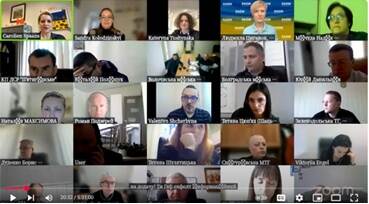
The record of the event is availabe via the Link